Curriculum & Teaching Methodology
From its inception, the school “dared to change”, the conventional, and experimented with innovative methods, in order to lay stress on personality development hand in hand with activity-based and experiential learning, and to maximize usage of the rural environment.
The curriculum focuses on two main aspects. These are: -
- Basic Academic Skills : comprising English, Mathematics, Environmental awareness, computer skills, local language, creative activities, and sensory skills
- Personality Development : to improve personal traits comprising Physical development, social awareness, hygiene, emotional development, good habits, and value education
Our quest to answer the question: “What should we teach primary level rural children and how?” is continuing. After experimentation over 10 years, the school has evolved a fresh syllabus. Many innovations and “out of the box” solutions have been adopted. These are summarized below: -
English Literacy for Rural Children
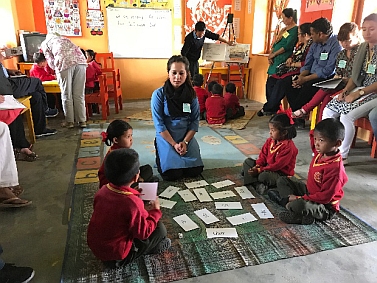
Composite English Literacy Class Demo
We have devised and formalized methodology for teaching English to Children coming from non-English speaking community, by introducing learning through verbalizing actions, phonics, role play, conversation, word building games, puzzles, one act plays, public speaking, long hand exercises, compositions on the computer, reading and storytelling.
English readers designed to teach the language systematically have been introduced. Authored by Margot Sherwill of Benalla rotary club of Australa, and printed with a grant from Bairnsdale Rotary club, 144 titles (one reader per week) are now in use What is unique about these books, is that all text and pictures are about the local children, their families, familiar landscape, local flora, agriculture, festivals, birds, butterflies and village activities.
Also we have published our own story books. This is a ongoing unique project: -
- Story books are authored by our teachers
- The content is local
- Illustrations are by children from class 3 & 4
Our children are doing well in English medium schools, after finishing their foundation course at the Awake and shine Primary School at Samthar.
Making the learning of Mathematics, fun
Focussing on findings the means to make children shed the fear of mathematics and start enjoying the subject, we have introduced practical activities such as counting beads, numbers ladder, counting natural objects, such as pebbles, leaves, twigs; Counting games, songs and rhymes. Learning tools in use consist of the Ganit Mala, weighing balance, trundle wheel, Dienes Blocks (of Thousands, Hundreds, Tens and Ones), Attribute blocks, puzzles and activity games, All these make learning of mathematics easy and fun.
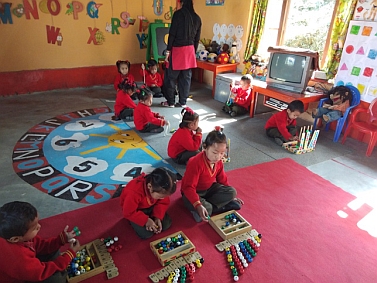
Nursery Class Counting Beads
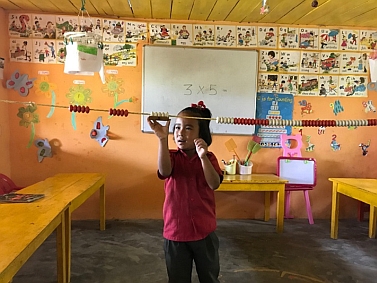
Ganit Mala
Personality development
Breaking new ground, we have included personality development in our curriculum, hand in hand with Academic learning. We aim to develop the personality of our children in a positive manner so that they can succeed in life. We employ a host of activities for positive development of personal traits, social awareness, hygiene, physical development, manipulative skills, emotional development, good habits, and value education
Computer literacy
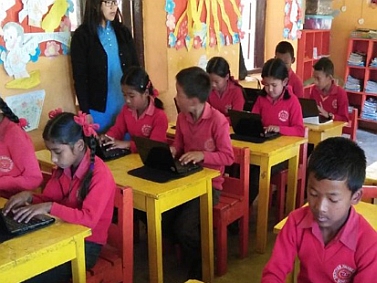
Our computer literacy teaching methodology allows children in class 1 to handle computers independently from Day 1. The syllabus comprises a total of 268 periods of hands on practice, spread over 4 years..
By the time the children finish class 4, they are able to use Paint, are expected to type, use word for simple drafting, insert images, send E-mails, and search the internet.
challenging assessment goals and abolished tests based on text book recall and
We have raised the bar for assessment goals, to 50 %., and evolved an assessment system with 73 % weightage for Academic skills and 27 % weightage for personality development. Tests based on text book recall, have been eliminated, Instead voice responses and activity- based assessment methods have been introduced.
Experiential learning
"Learning by doing". Is the new Mantra. It is also so much fun. We use experiential learning to expand the horizon, and as a tool to develop personality, inculcate original thinking, build self- confidence, inquisitiveness, and pride. The children get to improve vocabulary, composition skills, speech, clear thinking, and writing ability, and enhance their observation and recording skills.

Semaphore Signalling
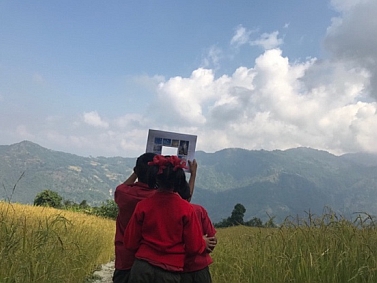
Cloud Watching
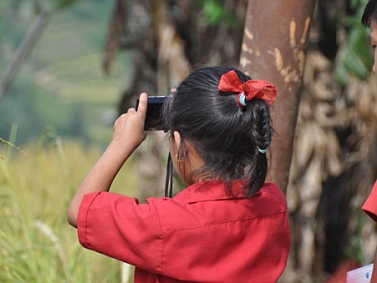
Recording
Experiential learning syllabus covers a host of experiences such as Nature walks, Inquisitive hikes, camp craft, Knots and lashes, silent field signals, Semaphore signalling, finding direction using prismatic compass, cloud, and star watching, mountain shapes, terraced farming, mountain springs, and gardening.
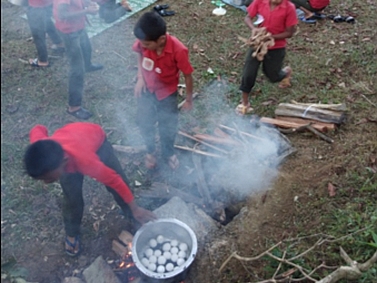
Camping
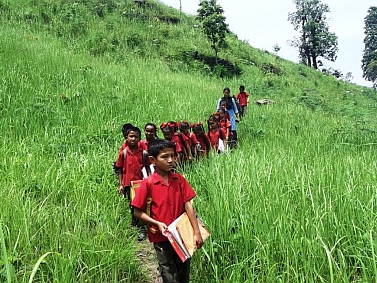
Hiking
Physical Development
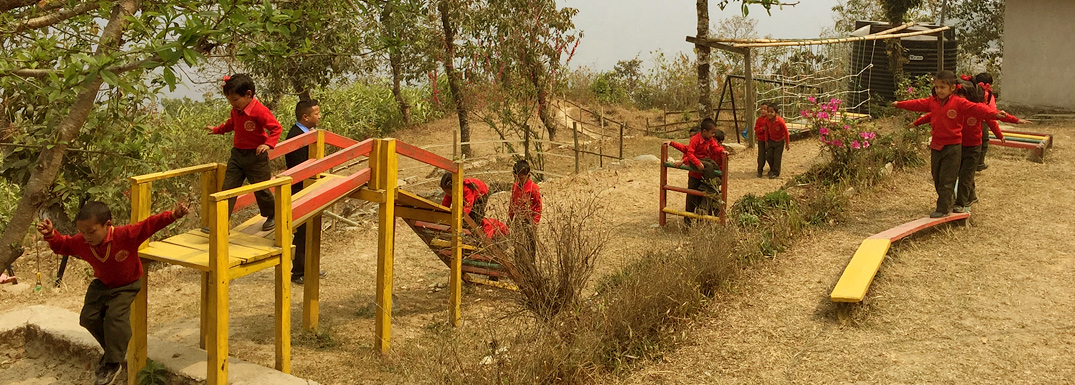
Confidence Course KG Level
As part of experiential learning, a comprehensive physical development program has been evolved to help children develop healthy habits by participating in structured physical activity which include 3 levels of innovative confidence courses, free standing exercises, jogging, power walking, skipping, throw & catch exercises with Frisbee &, tourniquet, ball games, and competitions
Experiential projects
As an extension of experiential learning children's projects are designed to go beyond the books and to use the wonderful local environment, to make learning interesting, improve self- confidence, learn dignity of labour, enhance awareness of Nature & Culture, and to observe, various facets of the local community. Subjects included are awareness of flowers and fauna, Farm animals, Art form from Natural objects, Sowing and harvesting of paddy and other crops, Cultural diversity, Kitchen garden project "Green Thumb", mud oven construction and baking,. After the field visits, children make a book in which the entire process is illustrated by compositions on the computer, drawings and photos.
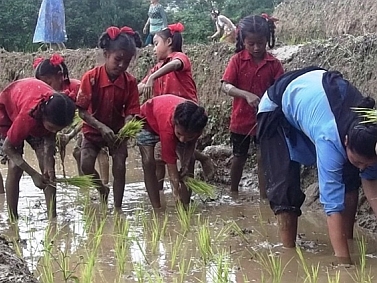
Sowing Paddy
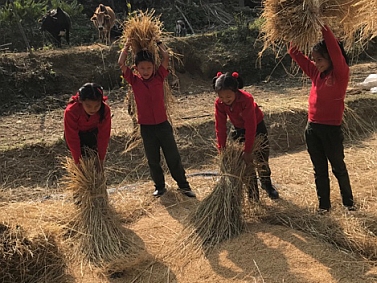
Threshing
Creating teaching team by empowerment of local youth, through in-house training.
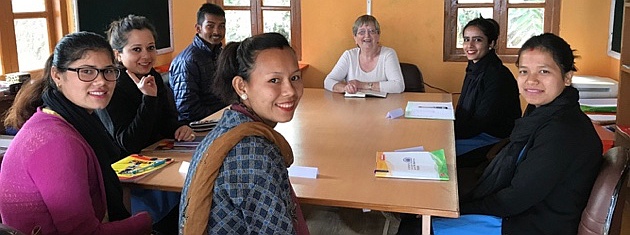
Teachers Induction Course
The school expects teachers to be dynamic, innovative, open to new ideas, and to genuinely care for the children. They are expected to develop a good rapport with their wards and communicate fluently in English. Ignoring conventional qualifications, the school has established a in- house training program for school leavers, and untrained teachers, to train teachers in activity based teaching and experiential learning. Volunteers conduct short induction courses, to improve classroom presence, spoken English and teaching methodology. This is followed by "on the job" training.
Role of Volunteers in training teachers
To improve creative and activity- based teaching methods adopted by the school, we are continuously seeking motivated experienced volunteers, advisors and consultants. Members of Benalla Rotary Club in Australia, invited two of our teachers; Angela Lepcha and Pascaline Lepcha, to visit Australia and participate in a tailor-made program of cultural exchange and exposure to latest teaching methods. Angela Lepcha has assumed the responsibilities of our Principal, and Pascalina Lepcha is now head of the pre-nursery and Nursery Section. Both are also assisting in setting up the new school at Chota Suruk. This marks a landmark in achieving our goal of empowering local community members.
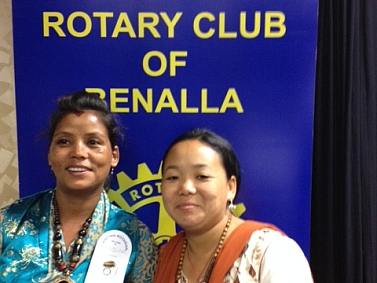
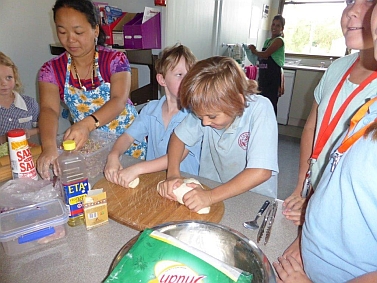
In Childrens Kitchen
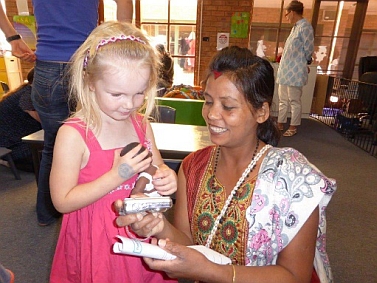
Making Friends
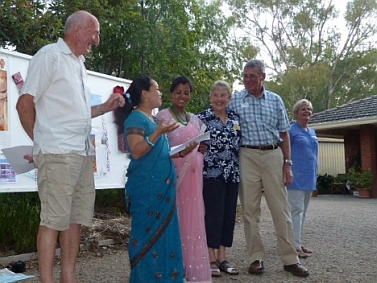
Meeting Sponsers
